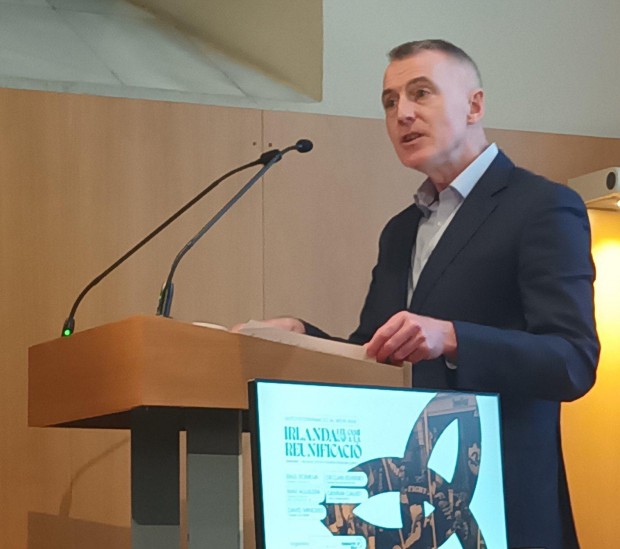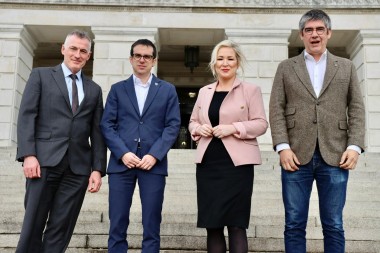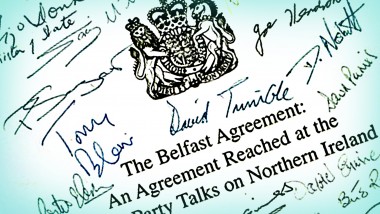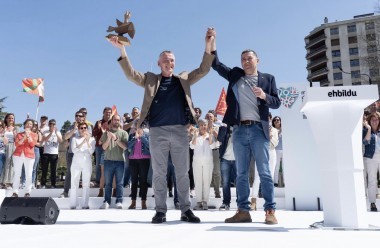11 April 2024
National Self-Determination - The Key International Struggle of our Times

The opportunity to secure self-determination for our peoples is within reach. National sovereignty is inseparable from the organisation of society in the interests of all citizens. That is, a process of democratic change, transition and social transformation. It should set the direction of democratic ambition for, and on behalf of the many, not the few.
Easter is a politically significant occasion in Ireland.
It marks the Proclamation of the Irish Republic in 1916 during what has become known as the Easter Rising.
The actions of those who participated changed the course of Ireland’s history in the 20th century, and ensured that the denial of self-determination and national democracy became the defining issue of modern Irish politics.
National self-determination is the essential international struggle of our time. It is central to the two most intense wars in the world at this time.
The Russian invasion of Ukraine and Israel’s genocidal war against the Palestinian people are direct violations of the right to self-determination and national sovereignty, and the United Nations Charter.
The primacy of self-determination also remains relevant in the broader European context where national democracy continues to be blocked, particularly in Euskal Herria, Catalunya and Cyprus.
When addressing a recent conference in Barcelona on the theme of ‘Self-determination in the World’, I emphasised that resolution of the national democratic question should be seen as synonymous with the ideal of European democracy.
National self-determination should be a key political theme in the forthcoming European elections for all left, progressive and democratic parties.
In the next two weeks, elections will occur in Euskal Herria, followed by Catalunya on 12 May. The politics of self-determination will be central to these election campaigns.
Both EH Bildu and Esquerra Republicana de Catalunya have been spearheading the objective of new national democratic arrangements for Euskal Herria and Catalunya. Other parties, such as Junts Per Catalunya, CUP, and a wide range of civic society organisations have also been very influential on the independence debate in both countries.
Significant political progress has been made through patient negotiations with the present Spanish coalition government over recent years. Much remains to be done, but there is no alternative to the negotiation process. Political unity and cohesion among all pro-independence forces will be essential to increasing popular appeal for self-determination and in turn positively affecting the outcomes of current and future negotiations with the coalition headed by Pedro Sanchez.
To date, the PSOE-led government has pragmatically engaged with the need to manage change in Euskal Herria and Catalunya.

The forthcoming elections may well increase the popular momentum for greater political change.
Ultimately, the Spanish democracy will be strengthened, not threatened, by recognising the right to self-determination and independence in Euskal Herria and Catalunya.
The importance of negotiations to democratically manage change is the transferable political experience of the Good Friday Agreement (GFA), and the Irish peace process.

This year, as republicans and nationalists commemorated the Easter Rising, a new future has moved onto the horizon, one of hope, possibility and opportunity.
What was previously unthinkable has begun to unfold in plain sight.
The permanent unionist majority in the north has disintegrated.
The political dominance of Fine Gael and Fianna Fáil has been ended.
Sinn Féin is the largest party in Ireland, and even though nothing is ever inevitable, everything is now possible.
The potential exists for Sinn Féin to lead government north and south at the same time.
The framework of the GFA has opened the door to full realisation of all this potential, through the exercise of self-determination.
The partition of Ireland has been a constitutional, political and economic failure.
As a result, many new voices are contributing to an exciting new conversation about Irish unity.
The appointment of Michelle O’Neill as First Minister in the north symbolises the change which is taking place all over Ireland.
In the 26 counties the appetite for change is also tangible.
The appointment of a new Taoiseach and a reshuffle of his cabinet posts means absolutely no change in government policy. This offering of ‘old wine in new bottles’, to paraphrase James Connolly, is too little, and too late.
The extent to which the lack of affordable housing and hospital waiting lists are now out of control, allied to chronic underinvestment in defence and community safety, expose the abject failure of all the coalition parties.
In the absence of putting their record before an immediate General election, they will instead be tested at the Local and European elections in June.
Throughout the next 12 months, Sinn Féin will contest at least four elections, including a Westminster election in the north.
All of these will be important opportunities to advance the case for change; of a society for all, which prioritises workers and families; to make the political connection between national democracy and economic and social justice: A national republic for the many, not the few.
This is why it is more important than ever for Irish Republicans to face outwards to engage with all citizens and sectors in our society.
Notwithstanding demographic and electoral change and the consequences of Brexit, constitutional change cannot be taken for granted.
Democratic persuasion about the advantages of a united Ireland will be crucial to secure and then win unity referenda in this decade.
Creating progressive alliances and coalitions with others must be paramount.
The same focus will be needed to maximise pro-independence support in Euskal Herria and Catalunya, and positively influence the achievement of national and democratic objectives.
Those who want the greatest change always have the most work to do.
Ireland, Euskal Herria and Catalunya share historic connections and solidarity.

Collectively, we are living through unprecedented and remarkable times. We have much to teach, and learn from, each other about managing change, political strategy, negotiations, and campaigning.
The opportunity to secure self-determination for our peoples is within reach.
National sovereignty is inseparable from the organisation of society in the interests of all citizens. That is, a process of democratic change, transition and social transformation.
It should set the direction of democratic ambition for, and on behalf of the many, not the few.
For all progressives and democrats in this world, the full realisation of national self-determination must be our collective future.



